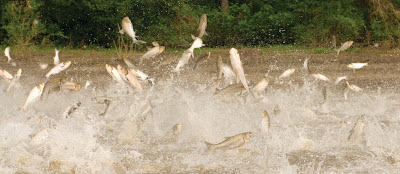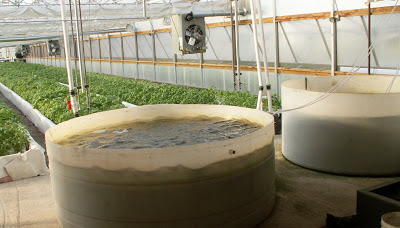A closer look at web tools and sites that boost research and empower Great Lakes communities to secure a healthy environment and economy.
.png) Aquaculture plays an increasingly vital role in securing long-term food supplies, and the Midwest is poised to help. In fact, a rich supply of raw materials and proximity to large markets makes Illinois and Indiana prime locations for aquaculture farms and related industries.
Aquaculture plays an increasingly vital role in securing long-term food supplies, and the Midwest is poised to help. In fact, a rich supply of raw materials and proximity to large markets makes Illinois and Indiana prime locations for aquaculture farms and related industries.
To help producers cash in on these benefits, IISG, University of Illinois Extension, and Purdue Extension teamed up to create Aquaculture Economics and Marketing Resources. The site provides leading research and how-to information for developing a productive, innovative, and profitable aquaculture business.
Visitors interested in starting a new business will find resources on everything from establishing an organizational structure to creating a business plan to securing financing. New and veteran producers can also find tips for connecting with consumers and tapping into niche markets.
Aquaculture Economics and Marketing Resources is one of several tools IISG uses to help aquaculture producers define markets and create value-added opportunities for their products. Since 2005, Kwamena Quagrainie has held roughly 40 workshops with over 1,200 participants. These and other efforts in Indiana resulted in about $15 million in farm sales of aquaculture products in 2013, a nearly five-fold increase over 2005.
To learn more about how aquaculture is strengthening Indiana’s economy, read our 2013 program impacts.
Category:
Website of the week: The ABCs of fish farming
January 21st, 2015 by iisg_superadminIn the news: Aquaponics could revolutionize urban eating
March 11th, 2013 by Irene MilesIllinois-Indiana Sea Grant, along with several other Sea Grant programs, universities, and researchers, have been involved in advising and establishing a number of aquaculture operations in the U.S. and around the world, including some aquaponics facilities. This video from our friends at Purdue University provides a terrific amount of detail about aquaponics and how the process could help sustainably grow food.
With the ability to grow plants and fish in a mutually beneficial system, aquaponics presents an especially viable and sustainable option to provide healthy and locally grown food for urban areas.
From The Atlantic Cities:
“Aquaponics is a method of combined fish and vegetable farming that requires no soil. The farmer cultivates freshwater fish (aquaculture) and plants (hydroponics) in a recirculating water system that exchanges nutrients between the two. Wastewater from the fish serves as organic fertilizer for the plants, while the plants clean the water of fish feces and urine. The net result: a 90 percent reduction in freshwater use compared with conventional fish farming, and a significant reduction in added nutrients such as fossil fertilizers. The system can be run without pesticides and, because the fish environment is spacious and clean, without antibiotics…In the lab, the pumps made gushy sounds at regular intervals. The water dripped. As the plants’ leaves evaporated moisture, I could hear the place breathe. I picked a ripe, red tomato from a vine. This lab, I sensed, could morph into an urban oasis: a lush, breathing organism inside the city. Unlike static green spaces like parks, this would be an actual farm as well as a place of tranquility in the city — not to mention a space that could generate the food to feed that city, with minimal harm to the environment or human health, just steps from residents’ tables.”
Follow the link above to the complete article, and visit our aquaculture webpage for more information.
Aquaponics and food farming take over abandoned Chicago factory
August 6th, 2012 by Irene Miles“The transformation is already underway and over the next few years, the factory will become a zero-energy, food business incubator, research facility, education space, and working urban farm. Plant Chicago is already growing greens and mushrooms and will soon start brewing beer and kombucha and raising tilapia in a sustainable system with zero waste.”
In the news: Worldwide fish populations headed towards depletion?
May 24th, 2012 by Irene Miles“Between 1950 and 2006, the WWF report notes, the world’s annual fishing haul more than quadrupled, from 19 million tons to 87 million tons. New technology — from deep-sea trawling to long-lining — has helped the fishing industry harvest areas that were once inaccessible. But the growth of intensive fishing also means that larger and larger swaths of the ocean are in danger of being depleted.”
Invasive fish could be a food solution for Haitians in need
May 10th, 2012 by Irene Miles Sometimes, what can be considered a problem in one area of the world might prove to be a solution to a problem somewhere else on the globe. One such case is the use of Asian Carp as a high-protein food source for Haitian children impacted by the devastating earthquake in January of 2010.
Sometimes, what can be considered a problem in one area of the world might prove to be a solution to a problem somewhere else on the globe. One such case is the use of Asian Carp as a high-protein food source for Haitian children impacted by the devastating earthquake in January of 2010.
“Some innovative thinking is now turning the problem fish into a high-quality protein source for the children at Zanmi Beni, run by Operation Blessing International. Researchers at NOAA’s Louisiana Sea Grant program and the Louisiana State University (LSU) AgCenter have successfully produced canned Asian carp pleasing to the Haitian palate. Ultimately, the product could deliver high-quality protein to people in need, be a boon to fishermen, provide a new opportunity for canneries, and reduce the population of an unwanted invasive species.”
Louisiana Sea Grant Fisheries Specialist Julie Anderson attended IISG’s Asian Carp summit and was able to network with several people including Carol Engle of the University of Arkansas. Carol’s work had involved developing a USDA-approved process for canning Asian Carp, making it possible to safely prepare, store, and ship the food where it was needed.
Recent News
- Relaunched website provides resources for proper medicine disposal
- Meet our Grad Student Scholars: Lena Azimi
- Spring brings a program review as well as education and outreach opportunities
- Public comments sought for Illinois-Indiana Sea Grant review
- Illinois Indiana Sea Grant announces new coastal ecosystem and community resilience specialist
IISG Instagram
Congress is finalizing the FY26 budget, and federal funding for Sea Grant programs across the country—including Illinois-Indiana Sea Grant—is uncertain. Sea Grant programs have consistently had broad community and political support, and now such support is more important than ever.
Add your name to our sign-on letter urging Congress to support continuation of programs benefiting the Great Lakes, supporting local economies, and connecting communities with science-backed solutions.
Scan the QR code or visit the link in bio to take action.

Stay updated with the latest environmental education happenings in the Great Lakes region. The Center for Great Lakes Literacy’s latest newsletter features upcoming events, professional learning opportunities, and valuable educational resources. Don’t miss out on these exciting updates—click the link in bio to read more and get involved!

Out with the old. A newly updated UnwantedMeds.org is here to make safe disposal of old medications easier than ever.
Read more at the link in bio.

We are excited to offer the opportunity to propose a speaker or panel session during the 2026 Emerging Contaminants in the Environment Conference April 28-29. The conference will feature traditional 15-minute presentations and a poster session on the latest in emerging contaminant research, policies, and outreach in the soil, water, and air.
The deadline to propose a session is June 16, 2025.
Learn more at the link in bio.

Categories
- Aquaculture
- Aquatic Invasive Species
- Buoys
- Climate Ready Communities
- Director's Blog
- Education
- Featured
- Fellowships
- Fisheries
- Funded Research
- Funding
- Great Lakes Cleanup
- Great Lakes Data
- Healthy Waters
- Internships
- Jobs
- K-12 Education
- News
- Photos
- Program
- Recreation & Tourism
- Resources
- Sea Grant Scholars
- Stormwater & Green Infrastructure
- Sustainable Community Planning
- The Helm
- Uncategorized
- Video
- Water Resource Economics

